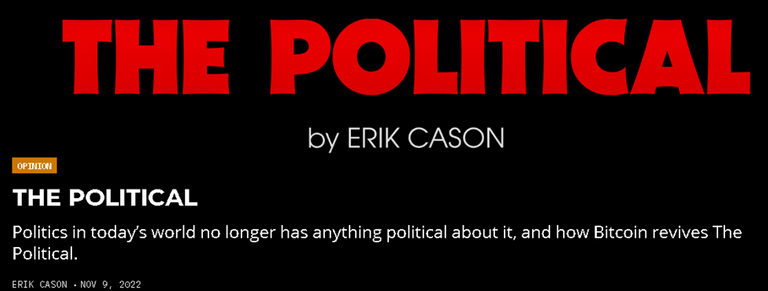Regulation and the Political
Yesterday, I browsed two articles that I assigned for today’s reading. This is because compared to the other articles I read, these two, especially the last one, require more time to sink in.
A Call for Swift Response
Regulation! Regulation! Regulation!
Two board members of the Dutch central bank after completing research are now convinced that cryptocurrencies are affecting negatively the roles of financial authorities around the world. Persuaded by such harmful influence, they are now pushing for an urgent response to establish a “comprehensive international regulation.”
They talked about the distinction “between backed and unbacked cryptocurrencies” and consider the latter as a serious threat. I think I heard the same argument from a top executive in one of the major banks here in the Philippines a few months ago and that is why he prefers CBDC over cryptocurrencies due to that claim of the absence of assets that back up most digital currencies. Moreover, they also don’t like the confusion surrounding the pricing of these digital tokens. These are just two examples of what they see as inherent dangers in cryptocurrencies.
Though calling for swift regulation, the two officers recognize the difficulty in implementation due to the international character of cryptocurrencies.
Such a call reminds me of the Eurodollar market. I am bringing back again the questions I raised in one of my articles. If the authorities cannot be successful in regulating a 65-year-old market, what made these two guys think that their call will be different this time? If in the Eurodollar market, the pro-regulation voices are in the minority, what made these two board members think that they will gain the majority support this time? And besides, if ever their call will be promptly responded to, such regulation can only apply to centralized exchanges and centralized crypto projects. What are they going to do with those entities like Hive that cannot be regulated? Will they create laws to criminalize transactions with decentralized crypto projects and exchanges? That would be an interesting development if such a case will happen.
The Political

The kind of economic-technical thinking that prevails today is no longer capable of perceiving a political idea. — Carl Schmitt, Political Theology
That’s an interesting quote and I think a very offensive one in the eyes of the so-called “progressives.” The quote implies that such a mind will only happen to those who are convinced that their political perspective is “THE” correct one that makes them blind to see other alternatives.
The title is very interesting. Though the writer is convinced that there is nothing left political in the true sense of the word in mainstream politics, he redeemed the term and applies such a prestigious title to the mother of all cryptocurrencies – Bitcoin!
Notice how he describes contemporary politics:
There is nothing in our day and age that is political about politics — it is just a show. A two-ringed circus to distract the multitudes into feeling like something could politically change when politics is exactly what will ensure nothing will change.
That’s a sad picture. It appears that the writer has given up hope. However, reflecting carefully on what he is saying he sees Bitcoin as offering a new kind of politics. This new breed of politics from his perspective “no longer troubles itself with the parties of the past or the ideology of state bureaucracy.” Instead, the focus is cutting the king’s head.
For him, Bitcoin is political “because it exists outside and beyond the power of any states and it creates a form of organization that is beyond electoral politics or bureaucratic systems of any state.”
Moreover, for Bitcoin to achieve its political goal, it is not expected to do what we usually do in the legacy system such as elections, legislation, and education. Its mere existence is enough. Such an accomplishment has been achieved by Bitcoin because it succeeded in “the creation of an independent, self-sovereign money that is loyal to no person, state or institution” without using any violent means. No great thinker, human institution, or revolutionary movement has done that in the last 100 years.
For Eric Cason, to appreciate the political accomplishment of Bitcoin, one must first “understand that fiat money is in and of itself political,” a tyrannical one. And here is how he describes in detail such kind of financial tyranny:
Today, however, the real basis of our commonality of wealth is that of tyranny represented through fiat money. Fiat money is not accountable to our laws and systems of politics but comes from jurisdictions that are outside and beyond our power as common people to impact, direct or change. No matter what political system you live under, there is no possibility to directly change how money is issued, directed, credited, placed, or created. Whether you are from communist China, capitalist America, socialist Europe, or the Global South; all monetary systems are part of the same bureaucracy that exists for the elite and powerful alone. It is a commonwealth of poverty and it is the most defining political feature of our age.
Bitcoin is political because its existence is a declaration that the time has come to end such tyranny. It is unreasonable to expect that the State will lead us to obtain this kind of freedom. Such a time will never come. With our current situation, only those who believe in statist propaganda will buy the idea that freedom can co-exist with the expanding power of the State.
The article is hard. It is not an easy read for me. As usual, one cannot be expected to agree with all the ideas he presented. I think the number of ideas he raised I agree with far outweighs the ideas I disagree with.
Yay! 🤗
Your content has been boosted with Ecency Points, by @rzc24-nftbbg.
Use Ecency daily to boost your growth on platform!
Support Ecency
Vote for new Proposal
Delegate HP and earn more